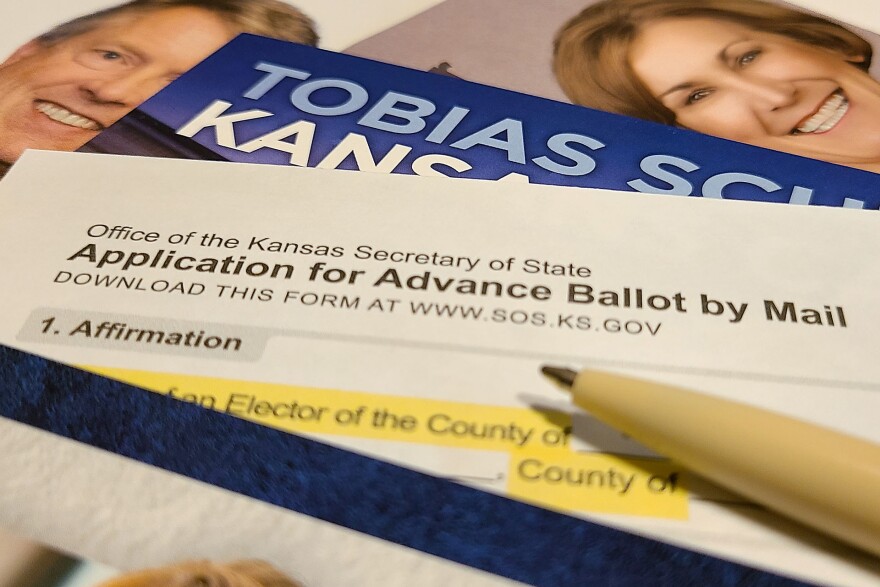TOPEKA — A federal court ruling permanently blocked a 2021 Kansas law that banned groups from sending advance ballot applications to voters, finding that state lawmakers tried to suppress free speech.
The case focused on the prefilled, mailed ballot applications that voting organizations sent to hundreds of thousands of Kansans leading up to the 2020 presidential election, which was rife with false accusations of illegitimate results nationwide.
Danielle Lang, senior director for voting rights at the Campaign Legal Center, said in a statement the recent court decision affirms that encouraging voter participation is protected under the First Amendment. The center was one of three attorney groups arguing against the ban.
“Kansas’s law was one in a nationwide trend by state legislatures moving to restrict this fundamental right,” Lang said.
But Kansas Secretary of State Scott Schwab, who was a defendant in the lawsuit, maintained that prefilled ballot applications are at odds with an informed electorate. A spokeswoman for Schwab’s office, Whitney Tempel, said Friday that his priority is reducing voter confusion and maintaining election integrity. Schwab is seeking the Republican nomination in the 2026 gubernatorial election.
“The use of pre-populated mail ballot applications contributes to misinformation and undermines voter confidence,” Tempel said in an email. “Unfortunately, some groups challenging these efforts appear to be advancing political agendas rather than focusing on what’s best for Kansas voters.”
Republican lawmakers passed House Bill 2332 during the 2021 session by overriding the governor’s veto. The law sought to ban any non-Kansas resident or business from distributing advance mail ballot applications to voters and prohibit any applications from containing personalized voter information. Supporters argued at the time the law ensured transparent elections free from corruption.
VoteAmerica and the Voter Participation Center, two national civic engagement organizations that are not based in Kansas, said in the original complaint that the law would have made “it impossible to continue their mission of expanding, encouraging, and assisting voter participation through their advance voting operations in Kansas.”
In the 2020 general election, around 112,000 Kansas voters mailed a pre-paid or pre-addressed envelope containing an advance ballot application, according to the lawsuit. About 69,000 of those applications were from VoteAmerica or the Voter Participation Center. VoteAmerica sends pre-populated advance ballot applications only to those who request them, while Voter Participation Center sends unsolicited applications.
County election offices received around 14,740 duplicate applications from voters who used prepaid envelopes from the voter center or its sister organization.
U.S. District Judge Kathryn Vratil evaluated in a 40-page decision whether the law was a content-based regulation and, if the law is content-neutral, whether lawmakers crafted the law for an “improper purpose” or reason, including suppression of free expression.
The defendants in the case — Schwab, Kansas Attorney General Kris Kobach and Johnson County District Attorney Steve Howe — said that HB 2332 was meant to minimize voter confusion, streamline efficiency in election administration and foster confidence in and protect the integrity of the electoral process. However, they didn’t explain how the law was designed to do those things, Vratil said in the decision.
Vratil also considered the timing of the Legislature’s introduction of HB 2332, which came a month after the Jan. 6, 2021, breach of the U.S. Capitol and about three months after the 2020 election.
Mail-in voting became “one of several scapegoats for the alleged ‘stealing’ of the 2020 presidential election,” Vratil wrote.
“In Kansas however, one week after the election, on November 10, 2020, Schwab had publicly declared that the 2020 election in Kansas was successful, without widespread, systematic issues of voter fraud, intimidation, irregularities or voting problems — an undisputed fact which calls into question any purported legislative intent to root out fraud, promote efficiency or avoid voter confusion in Kansas elections,” Vratil said.
It was “more probably true than not true,” the decision said, that the Legislature prohibited voting groups from sending prefilled applications to suppress speech.
The ruling was the second time the case had been in federal court, and, before that, a state court deemed the law unconstitutional. In 2023, a federal judge ruled that a ban on prefilled applications was “an unconstitutional infringement on plaintiff’s First Amendment rights to speech and association.” Schwab, Kobach and Howe appealed to the Tenth Circuit Court of Appeals, which sent part of the case back to district court for review.
During the 2025 session, lawmakers passed and the governor signed into law House Bill 2016, which included modifications to advance ballot application law. It now says that no portion of an application can be completed before mailing it to a registered voter, except the date of the election.
Another 2025 voting-related law that eliminated the three-day mail-in ballot grace period is also being litigated.
This story was originally published in the Kansas Reflector.





